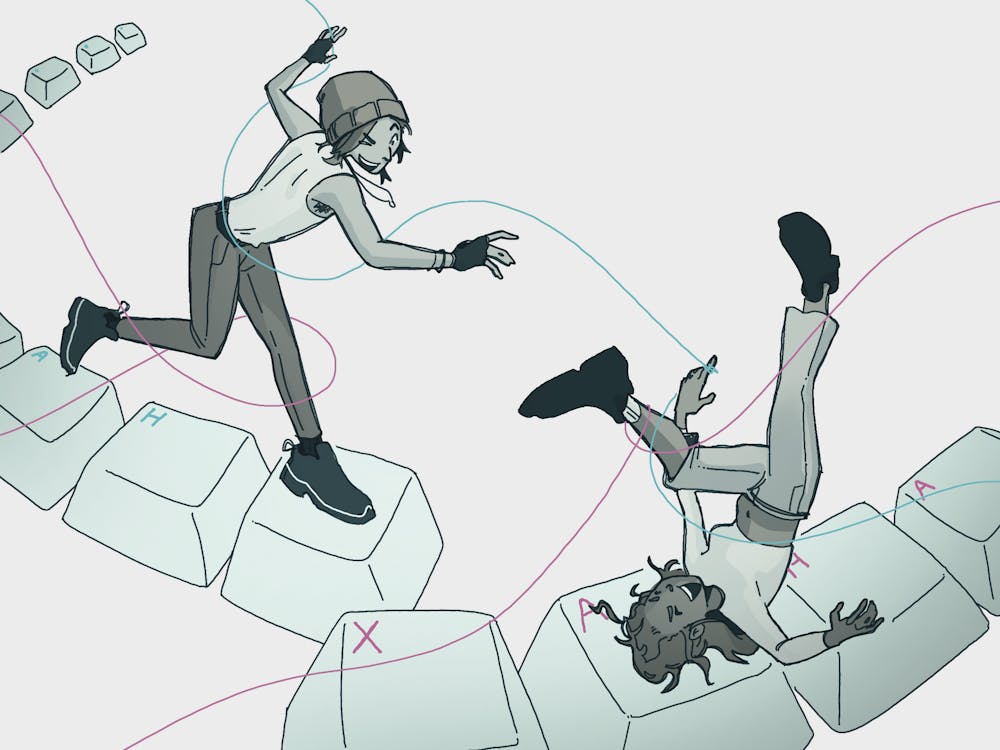‘AHAHAHXHSHA’ reads the text from my friend. ‘i cabt wait for otmorrow!’
I can imagine her fingers flying furiously across her phone, a reflection of her wonderful effervescence (and possibly the fact that she had just completed a rather passionate analysis of why Christmas movies are horrible but necessary and that she was glad we were watching the newest sappy cinematic masterpiece of the genre together the next day.)
‘SAME,’ I replied. ‘its goinh to be sp bad that its good,’ typed my fingers swiftly, matching her energy—and her proclivity for typos. To be honest, I can’t remember the last time I had a full conversation with someone that did not have at least one ‘so trye,’ ‘taht,’ or ‘CHRISDFMAS TRE’ (the last one’s a bit hyper-specific—sorry.)
Here’s a fun fact: Typos can help us understand human beings on a neurochemical level. But let’s start at the beginning. Ultimately, it all comes down to guitars.
Within a guitar, it is resonance that amplifies the vibrations of strings and blends those sounds into harmonious and vibrant radiations to create ethereal works of art, like Zeppelin’s “The Rain Song” (that song is MAGIC, change my mind). If the guitar is analogous to our cerebral cortex and the strings are fine strands of neurons, then when the neurons in our cerebral cortex all fire simultaneously at a specific frequency, all parts of the cerebral cortex, separated by long distances, would suddenly begin to function in synchrony. A myriad of sights, sounds, and emotions get combined into our experiences like the medley of M&Ms, Oreos, and sprinkles on a toddler’s choose-your-own-toppings sundae. This tunes our attention and focus.
When we’re excited to tell a story, design a new cheese board for a dinner party, or rant about the adorable frivolity of Hallmark Christmas movies, the little strings within our brains spring up in a lively dance of neural networks, and neurotransmitters are spurred into action as usual, but the increased emotional turbulence and resulting conflicting signals may cause errors in neural communication.
A study showed that during a writing activity, which requires complex neural processing, the strings of neurons in our brains generalize simple transformations from letters to words and words to sentences so they can focus on tasks expressing complex ideas succinctly. Thus, we instinctively write ‘there’ instead of ‘their’ and can understand their intended meaning. Our brains tell us what we think we’re saying, and our perception is primed to confirm that what’s on the screen matches what’s in our head.
When we reread what we’ve written and notice errors, the electric potential in the frontal lobe of our cerebrum drops by a few microvolts, leading to error-related negativity (ERN), peaking within 100 milliseconds after the incorrect muscle activity ends. Neurotransmitters like the elegant 3,4-dihydroxyphenethylamine (aka dopamine) skip merrily from string to string to provide the chemical incentive for improving one’s response (not accidentally calling Miss Anahita Miss Anandita…again).
That’s why we double- and triple-check emails before sending them out. And why we obsessively reread even our signature while writing a message—because what if we get it wrong? (Of course I’m not speaking from experience! *laughs nervously*)
But, on the other side of the spectrum, sometimes we don’t feel compelled to correct our typos. That’s when we’re comfortable enough with the person we’re communicating with to present our authentic selves. Interacting with such people provides us with pleasurable rewards or motivational experiences to the extent that ERN-induced dopamine is no longer needed to promote positive behavioral responses.
So the next time your friend sends you a four-word text with at least five spelling mistakes, one thing’s certain: While the strings of their nervous system may have misfired their signals, the strings that tether their heart to yours tenaciously persevere.





